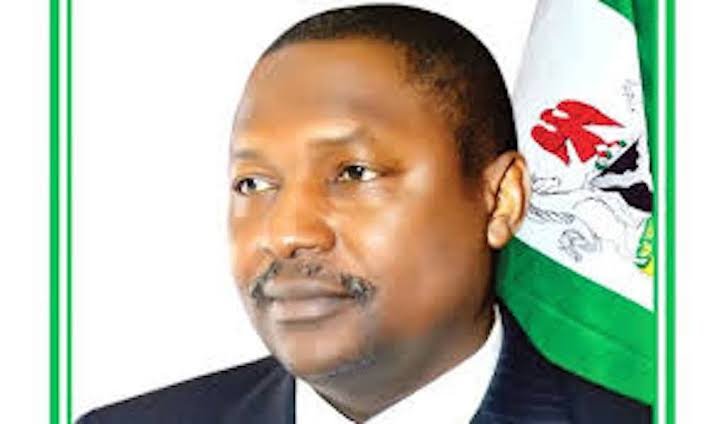36 Governors Call For Dissolution Of Malami-led Implementation Committee
The 36 state governors on Wednesday called for the immediate dissolution of the Presidential Implementation Committee on the autonomy of state legislature and judiciary.
The committee, set up by President Muhammadu Buhari in December 2018, is the brain behind the Executive Order 10 issued by the President in May 2020, for the enforcement of financial autonomy of the two arms of government at the state level.
The Nigerian governors, under the aegis of the Nigeria Governors’ Forum (NGF), chaired by Governor Kayode Fayemi of Ekiti State, made the call for the dissolution of the committee at a teleconference they held on Wednesday.
In the communique they issued at the end of their Wednesday’s meeting, the governors accused the committee, led by the Attorney-General of the Federation (AGF), Abubakar Malami, of creating disaffection between state governments and the other arms of government, and therefore called for its dissolution.
The resolution was arrived at during their deliberation on the Executive Order 10, which relates to the ongoing nationwide strike by judiciary workers. The workers have shut down courts across the country for 45 days as of Thursday, in agitation for the implementation of the financial autonomy of the judiciary.
“The NGF resolved to call for the immediate dissolution of the Presidential Implementation Committee on the Autonomy of State Legislature and Judiciary as this Committee is now acting as a permanent committee basically misguiding and overheating the relationship between State Governments and the other arms of government,” the forum’s communique, signed by Mr Fayemi, read in part.
The governors’ call for the dissolution of the committee coincided with Wednesday’s resolution by the striking members of the Judiciary Staff Union (JUSUN) to continue with their ongoing strike until their demand for the financial independence of the judiciary is met.
President Buhari had set up the Mr Malami-led committee in December 2018 to fashion out modalities for the enforcement of section 121(3) of the constitution on the financial independence of the arms of government.
The committee recommended the issuance of the Executive Order 10 as an instrument for the enforcement of the constitutional provision which Mr Buhari signed in May 2020.
RelatedNews
Reps ask FG to ensure speedy resolution of JUSUN strike
Buhari approves Lagos, Abuja airports as special economic zones
NSCIA appeals for peaceful resolution of NLC strike in Kaduna
Akeredolu tackles Malami, says governors’ decision to ban open grazing irreversible
The order empowers the Accountant-General of the Federation to deduct from the federation account, the amounts due to state legislatures and judiciaries from the monthly allocation due to the states when the two other arms of government do not get what they are entitled to.
Mr Malami, who doubles as the Minister of Justice, has, on numerous occasions, publicly maintained an uncompromising stance on the enforcement of the financial autonomy of the state legislatures and judiciaries and the validity of the Executive Order 10.
But the governors, who have shown years-long reluctance to implement a system of funds allocation that gives financial freedom to the other arms of government in their states, have gone to court, to challenge the validity of the executive order.
Earlier before the issuance of the Executive Order, the presidential committee, in a 2019 report, accused the state governments of failing to comply with the constitutional provision on the financial autonomy of the two other two arms of government.
“As budget performance across 36 states of the federation shows that whilst the least allocations to the state judiciary in the past three years was 0.6 per cent of the budget of the entire state, the highest allocation was 4.89 per cent, and therefore, urge the governors as the heads of the executive arm of government to begin full implementation of the financial autonomy granted the legislature and the judiciary,” the report had partly read.
Malami defends Executive Order 10
Meanwhile, while featuring on a Channels Television programme, ‘Politics Today’ on Wednesday, Mr Malami maintained that section 121(3) of the constitution guaranteeing the financial autonomy of the judiciary and legislature at the state level was a non-negotiable right at both the federal and state levels.
The minister faulted the governors’ argument against the constitutionality of the Executive Order 10.
He insisted that the order “is designed and intended to give enforcement spirit to the autonomy”.
“In addition to the constitutional amendment, we equally have in place, the Executive Order 10, signed by the President, which, in effect, is designed and intended to give enforcement spirit to the autonomy as contained in Section 121(3).
“Arising therefrom, there were contentions, particularly on the part of the governors as to the application and operation of the provision of Section 121(3) and the Executive Order. And you have, in that respect, an implementation committee, among others.
“On the side of the implementation committee, there have been series of engagements, which are ongoing. I think, as a process, we are evolving,” the AGF said.
Talks to resolve Executive Order10 rifts have reached advanced stage
The governors, at their meeting on Wednesday said talks had reached an advanced stage with the Ministry of Labour, Conference of Speakers, National Judicial Council (NJC) and the NGF on the Executive Order 10 issue.
“All parties are working earnestly to resolve the issues surrounding the implementation of the order.
“There are however legal aspects of the order that need to be tied up, but which cannot take place if officials responsible for these final processes are on strike.
“Governors are happy to implement the demands of the Judiciary and the Legislature.
The Judiciary Staff Union of Nigeria (JUSUN), which is the umbrella body of Nigeria’s judiciary workers, began its nationwide strike on April 6 in protest against the non-implementation of the judiciary’s financial autonomy particularly at the state level.
PREMIUM TIMES reported how JUSUN had rejected the 36 state governors’ proposed template for the implementation of the judiciary’s financial autonomy being demanded by the workers.
The governors, in the said proposal, seek the creation of a State Account Allocation Committee (SAAC) to oversee the distribution of funds to the three arms of government at the state level.
But in a communique issued after a May 8 meeting of JUSUN’s National Working Committee (NWC), the union insisted on its demand that funds meant for the state judiciaries must be deducted directly from the federation account and paid to the heads of courts through the National Judicial Council (NJC).
It maintained that the provisions of the constitution “cannot be negotiated, doctored, manipulated and therefore must be obeyed”.
As a condition to end its ongoing strike, the union insisted that all the state judiciaries’ funds for October 2020 till May 2021 must be deducted directly from the source, the federation account, and paid to the heads of courts through the NJC as prescribed by the constitution.
PREMIUM TIMES















Post Comment